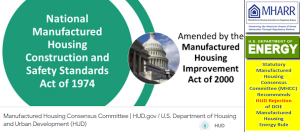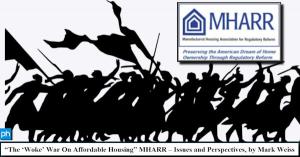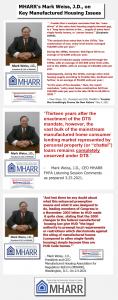

 A Legal Action has been Filed on the Department of Energy (DOE) Manufactured Housing Energy Rule. This suit has been encouraged by the Manufactured Housing Association for Regulatory Reform (MHARR) Statutory Manufactured Housing Consensus Committee (MHCC) Recommends HUD Rejection of DOE Manufactured Housing Energy Rule. “The Woke War on Affordable Housing.” MHARR–Issues and Perspectives by...
A Legal Action has been Filed on the Department of Energy (DOE) Manufactured Housing Energy Rule. This suit has been encouraged by the Manufactured Housing Association for Regulatory Reform (MHARR) Statutory Manufactured Housing Consensus Committee (MHCC) Recommends HUD Rejection of DOE Manufactured Housing Energy Rule. “The Woke War on Affordable Housing.” MHARR–Issues and Perspectives by... 
A Legal Action has been Filed on the Department of Energy (DOE) Manufactured Housing Energy Rule. This suit has been encouraged by the Manufactured Housing Association for Regulatory Reform (MHARR)

Statutory Manufactured Housing Consensus Committee (MHCC) Recommends HUD Rejection of DOE Manufactured Housing Energy Rule.

“The Woke War on Affordable Housing.” MHARR–Issues and Perspectives by Mark Weiss,JD, Manufactured Housing Association for Regulatory Reform.

Click the image and follow the prompts to expand. Manufactured Housing Facts – Manufactured Housing Association for Regulatory Reform (MHARR) Infographic. Manufactured Home Facts, Insights, Photos.

Mark Weiss, J.D., President and CEO of the Manufactured Housing Association for Regulatory Reform (MHARR) quotes on Key Manufactured Housing Industry Issues.
Two Manufactured Housing Associations filed Case No. 23-cv-00174 in the U.S. District Court for the Western District of Texas re: DOE’s pending MH energy rule.
— Mark Weiss, J.D., President and CEO of MHARR.
WASHINGTON, D.C., U.S.A. , February 17, 2023 /EINPresswire.com/ — Just three months prior to the scheduled May 31, 2023 implementation date for the destructive U.S. Department of Energy (DOE) final manufactured housing “energy conservation” standards rule, the Manufactured Housing Institute (MHI) and the Texas Manufactured Housing Association (TMHA) have filed a court action against the DOE final rule in the U.S. District Court for the Western District of Texas. The lawsuit, filed on February 14, 2023, seeks a stay of the impending implementation of the DOE final rule and other related relief. In both substance and approach, this court action tracks steps specifically urged by MHARR in August 2022.
In the August 2022 MHARR Issues and Perspectives column, entitled “Why the DOE Energy Rule Should be DOA”, MHARR called on MHI to use its resources to file a court action against DOE seeking an injunction against the May 31, 2023 implementation of the DOE final rule. In that article and analysis, MHARR set forth, in detail, both the legal basis and practical rationale for such an action, as well as various claims and arguments, including substantive and procedural defects inherent in the DOE rule (addressed in multiple sets of MHARR comments to DOE and the Manufactured Housing Consensus Committee), that could be asserted in such an action. It also stressed the urgent need for timely action in order to secure relief well in advance of the implementation date.
Among other things, MHARR called for (and offered to assist with) a court action under the federal Administrative Procedure Act, based on DOE’s failure to fully and properly calculate, account for, and consider all of the anticipated costs of the rule. This included and encompassed DOE’s failure to propose and estimate the costs of testing, compliance and enforcement of the final standards, its use of artificially low inflation indices for the wholly-deficient cost “analysis” that it did perform, and its failure to consider other related factors that would result in costs substantially exceeding anticipated benefits. MHARR also urged litigation based on DOE’s failure to fully and properly consult with HUD and the Manufactured Housing Consensus Committee (MHCC) as envisaged by the rule’s authorizing legislation – the Energy Independence and Security Act of 2007 – and, just as importantly, DOE’s thoroughly corrupted “negotiated rulemaking” process, which irretrievably tainted the final rule from step-one (and against which MHARR cast the only “no” vote at every step).
As set out by MHARR, the objective of such a court action was to invalidate the DOE final rule – and the entirety of the rulemaking process which led to that rule, beginning in 2008 – and to compel DOE to go back to “square one” with respect to manufactured housing energy standards in full and proper consultation with both HUD and the MHCC, from the start, as expected and authorized by Congress.
The MHI filing, which apparently follows the failure of other legislative and Executive Branch approaches pursued by that organization – the futility of which MHARR anticipated and explained in its August 2022 analysis — thus appears to be a last resort, rather than the first step toward obtaining meaningful relief that MHARR urged in its detailed blueprint some six months ago. Consequently, while MHARR gives MHI due credit for taking the necessary step of initiating this litigation, it should have been instituted months ago in order to avoid the type of chaos which has now begun to engulf the industry with, among other things:
(1) Uncertainty among manufacturers as to whether they must prepare for compliance with the DOE standards as of May 31, 2023;
(2) Corresponding uncertainty among IPIAs and DAPIAs regarding enforcement of the DOE standards and the scope of their authority (if any) in the absence of corresponding HUD standards (with at least one IPIA/DAPIA stating in a communication to manufacturers that it will not require compliance with DOE standards not incorporated within the HUD Code);
(3) A lack of any specific, valid action by HUD; and
(4) The absence of any type of testing, enforcement or other regulatory mechanism in advance of the May 31, 2023 implementation date.
In view of the foregoing, the pending lawsuit must be about more than just delaying the implementation of the final DOE standards rule. Rather, it must be about vacating that rule, based on its inherent and multiple fatal defects, and sending the entire rulemaking process back to the very start, so that there can be proper consultation with HUD and the MHCC, and complete elimination of the inherent and fundamental taint that DOE’s phony “negotiated rulemaking” process infused into the process leading to the May 2022 DOE final standard.
MHARR, as it has done since the outset of this matter, will continuously evaluate this litigation for further steps that may be needed and will consult with members at the upcoming MHARR Board of Directors meeting.
cc: Other Interested HUD Code Manufactured Housing Industry Members
Manufactured Housing Association for Regulatory Reform (MHARR)
1331 Pennsylvania Ave N.W., Suite 512
Washington D.C. 20004
Phone: 202/783-4087
Fax: 202/783-4075
Email: [email protected]
Website: manufacturedhousingassociation.org
The full press release and attachments are found at the link below on the MHARR website.
Legal Action Filed on DOE’s Manufactured Housing Energy Rule
The primary case pleadings in Case No. 23-cv-00174, request for a temporary restraining order (TRO), and related are linked here.
Related Note: as the DOE manufactured housing energy standards implementation date has approached, production of new manufactured housing reversed its prior trend of steadily increased volume. New manufactured home production has since slid into its third month of downturn, per data from HUD. See the facts at this link below.
About MHARR
The Manufactured Housing Association for Regulatory Reform is a Washington, D.C.-based national trade association representing the views and interests of independent producers of federally-regulated manufactured housing.
Additional Related Information from MHARR
The most complete known monthly reporting resource made publicly available by a national manufactured housing trade organization is found at this link below. Years of monthly reports, statistics and data are available free to the media and public via this link.
https://manufacturedhousingassociationregulatoryreform.org/category/manufactured-home-shipments/
Reprints of MHARR Interviews Conducted by MHProNews
Interview with Mark Weiss, J.D., President and CEO of MHARR is linked below.
Interviews of MHARR’s senior advisor and founding president and CEO, Danny Ghorbani, conducted by industry-leading MHProNews.com, are found at this link here.
MHARR Articles Focused on Proper Implementation of the Manufactured Housing Improvement Act of 2000 (MHIA or 2000 Reform Law) and its “enhanced preemption” provisions are found at the link below
MHARR Accomplishments
MHARR’s History and Objectives
Brief History and Objectives of the Manufactured Housing Association for Regulatory Reform (MHARR)
Mark Weiss, J.D., President & CEO
Manufactured Housing Association for Regulatory Reform
+ +1 202-783-4087
[email protected], [email protected]
Visit us on social media:
Facebook
Twitter
LinkedIn
YouTube
Other
![]()
Article originally published on www.einpresswire.com as Legal Action Filed on DOE’s Manufactured Housing Energy Rule, per Manufactured Housing Association for Regulatory Reform
originally published at HUMAN RIGHTS - USA DAILY NEWS 24

 ,
,